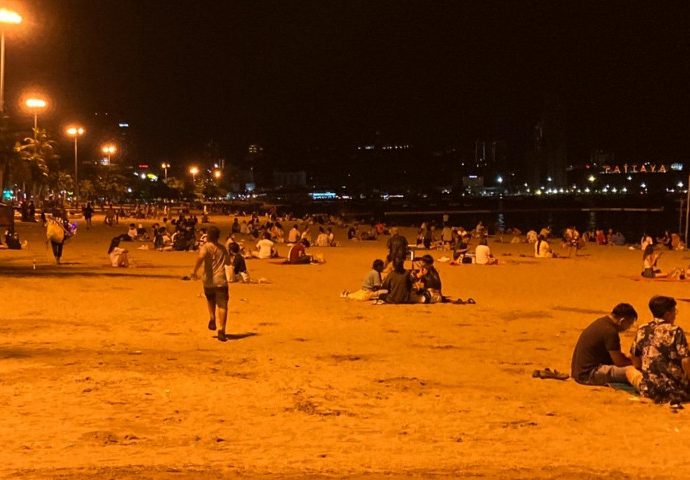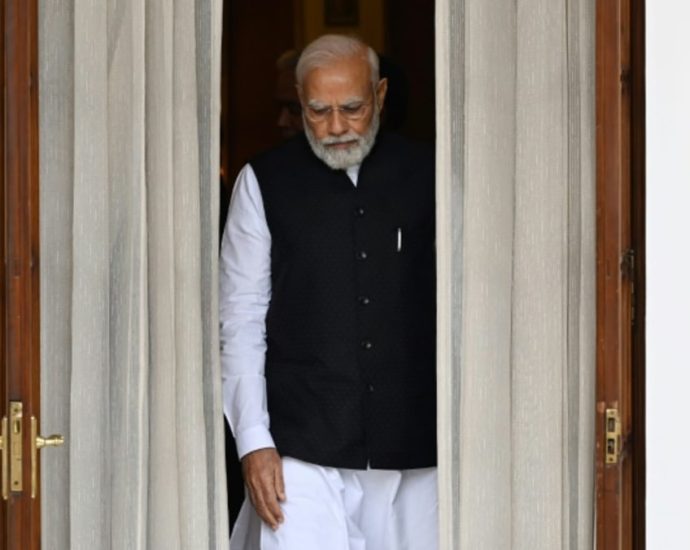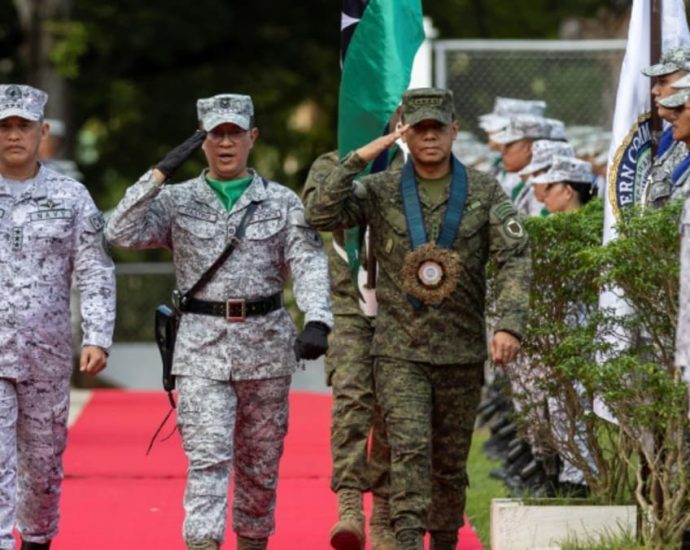Tourist visa requirements eased for Chinese visitors

PUBLISHED : 11 Aug 2023 at 04:00
The government has further relaxed its tourist visa requirements and shortened the standard time required for approving visas for Chinese visitors in a bid to make the process easier for people visiting the country.
Last week alone, 95,581 Chinese arrived in Thailand, representing the largest proportion of international visitors, followed by Malaysians (73,810), South Koreans (37,754), Indians (27,707) and Vietnamese (25,717), deputy government spokeswoman Rachada Dhnadirek said yesterday.
Under the newly relaxed visa requirements, Chinese visitors to Thailand are required to submit along with their visa application just six documents, namely their passport, three photos, an air ticket, a document showing their accommodation in Thailand, a document certifying their permanent residence, and financial statements, she said.
This will truncate the application process from 14 to seven working days, she noted.
The Ministry of Foreign Affairs and the Ministry of Tourism and Sports are also working to sync their tourist visa application database systems in order to speed up the process for all foreign visitors, Ms Rachada said.
Prime Minister Prayut Chan-o-cha was impressed by the steady growth in the number of tourists visiting Thailand, particularly during the long holiday from July 31 to Aug 6, when the country welcomed 80,000 international visitors each day on average, she added.
The cumulative number of international tourists visiting Thailand since the beginning of this year has already hit 16 million, with those from Malaysia, China, South Korea, India and Russia ranking as the top five countries.
City considers beach operating hours
PUBLISHED : 11 Aug 2023 at 04:00

Pattaya City is considering imposing opening hours on its beaches to curb a growing number of noisy night owls who party into the morning.
The city has received an increasing number of complaints about the nighttime visitors who like to play loud music using portable speakers while drinking alcohol and partying on Pattaya’s popular beaches, Wutthisak Roemkitchakan, the deputy city mayor, said yesterday.
A number of these visitors continue drinking and partying and refuse to leave even when city rubbish collectors show up in the morning to clean the beaches, he said.
This results in the beaches being left littered with rubbish the following day, he said.
“The city now is thinking of imposing opening and closing hours on these beaches as this can be a solution to the problem,” he said.
Currently, the city doesn’t have regulations on the opening and closing time of its beaches, meaning they are open around the clock, he said.
The city previously tried to step up patrols on the beaches, but it was impossible to find enough security officers to do so every night, he said.
The city’s beaches have attracted more visitors since undergoing a major expansion and renovation, he said.
Normally, these beaches do not have many visitors on weekdays, and most of them leave early in the evening, he said.
However, the number of visitors is usually much higher on Fridays, Saturdays and Sundays, with many who like to drink alcohol and party late into the night, he said, adding that all city authorities can currently do is ask for their cooperation to leave.
Complaints received by the city authorities also noted loud noises made by a number of nightclubs, most of which were open-air places on beaches, he said.
In response to these complaints, he said, the Pattaya municipality and Bang Lamung district authorities inspected these night entertainment establishments and asked them to control the volume of their music.
Officials recommended a few measures, including building a proper sound-proof room for guests, he said.
More measures will be jointly implemented with local police to curb the noise pollution in Pattaya, he said.
In other news, Pipit Rattanarak, a United Thai Nation Party MP for Surat Thani, voiced his concern over shortage problems being faced on the popular islands of Koh Samui and Koh Phangan in the South.
Speaking during a House meeting yesterday, Mr Pipit pointed to the need for all agencies to boost the handling of transport services, as well as water and electricity supplies on the islands. More measures are required as the islands are receiving a rising number of visitors, he said.
Officers transferred after gambling raid

PUBLISHED : 11 Aug 2023 at 04:00
Chiang Mai: Five senior police officers from Chang Phueak police station have been transferred to inactive posts for allowing a gambling den to operate under their watch.
The transfer order came after authorities raided the 89 CLUB Casino in the Santitham area of tambon Chang Phueak in Muang district on Wednesday after administrative officials received complaints about it.
Pol Maj Gen Thawatchai Pongwiwattanachai, the Chiang Mai Provincial Police chief, said yesterday the gambling den’s location is under the jurisdiction of Chang Phueak Police, so he ordered the transfer of the five senior officers to inactive posts in the province’s main operations centre.
A fact-finding probe has been launched to find out how the casino came to be operating.
The casino has sullied the image of the province, the commander said, adding he has instructed police stations in the province to beef up measures against illegal activities and rein in officers who engage in misconduct.
A source said local administrative officials were informed gambling activities were taking place at two locations — the 89 CLUB Casino and Phattarawan Snooker Club, both in the Chang Phueak area.
Ronnarong Tipsiri, an inspector attached to the Provincial Administration Department, led his team with Chiang Mai Provincial Administrative officials in raiding the 89 CLUB Casino. His team included more than 40 officers from the Investigation and Legal Affairs Bureau and Territorial Defence Volunteers Bureau.
The two dens offered a variety of gambling activities, such as the Dragon Tiger card game, Hi-Lo, and Baccarat, attracting over 100 gamblers each day.
Wednesday’s raid at the 89 CLUB Casino found the building had the capacity to accommodate 300 customers with a single exit. Installed around the building were 11 CCTV cameras monitoring the gamblers’ every move.
They were prohibited from using mobile phones on the premises. All phones had to be left at a check-in desk.
During the raid, police officers arrested 104 people, 19 of whom were card dealers and croupiers. They also seized 31 cars, 10 motorbikes, cash and gambling paraphernalia.
All those arrested were taken to Chang Phueak Police Station — as were the seized items — where they were charged with being involved in and operating illegal gambling activities.
Banks urged to act fast on scam claims

Cop report wait ‘too slow to stop losses’
PUBLISHED : 11 Aug 2023 at 04:00
Banks must stop illegal transactions upon request by their clients to prevent customer losses from online scams, said Minister of Digital Economy and Society (DES) Chaiwut Thanakamanusorn.
The Royal Decree on Cyber Crime Prevention and Suppression that came into effect on March 17 empowers banks to suspend any accounts which they suspect are being used by scammers without having to wait for an order from the police or victims.
As such, Mr Chaiwut said banks must set out a mechanism to support clients who have fallen victim to a suspected scam.
His warning came after TV news anchor Paweenamai Baikhloi revealed yesterday that she had lost over one million baht after falling victim to scammers posing as officials from the Department of Land.
In her complaint filed with Phasi Charoen Police on Aug 9, Paweenamai said the scammer contacted her on Line, claiming to be an official from the department who was reaching out to update her tax details.
The scammer was able to convince Paweenamai to give out her personal information by citing several details of the land she owns. However, she became suspicious when the scammer asked her to open a link and download a file which they claimed to be a DoL official application.
She stopped complying with the scammer’s instructions, but by the time she realised, the gang had managed to drain over a million baht from three bank accounts under her name.
The anchor said her bank initially rejected her request to suspend her accounts, saying she needed to file a police report before they could do so. When she finally had all the documents she needed, six hours had lapsed since the accounts were drained by scammers.
Mr Chaiwut warned the public not to click on any suspicious links sent through a Line chat, especially after being told to by unknown individuals claiming to be public agency employees, as all public agencies have been instructed not to reach out to clients over the phone.
Mr Chaiwut also suggested that the public be more aware of the official website or applications of public agencies and/or banks to minimise the risk of being scammed.
The DES will also examine the DoL database to find evidence of data leakage or sale, which is illegal under the Personal Data Protection Act, said Mr Chaiwut.
Millionaire jailed over land grab

PUBLISHED : 11 Aug 2023 at 04:00
The Criminal Court for Corruption and Misconduct Cases, Region 8, has sentenced millionaire Prayudh Mahagitsiri to two years and eight months in jail over a land grab scandal, according to the National Anti-Corruption Commission (NACC).
Commission secretary-general Niwatchai Kasemmongkol said the court found 10 former land officials in Krabi guilty of illegally issuing title deeds for state-owned land covering about 19 rai in Muang district.
The businessman was found guilty of aiding state officials in the illegal issuance of the title deeds, he said.
One defendant was initially sentenced to six years in jail, while the rest, including Prayudh, received four years each, he said. However, due to their confessions, the first defendant had his jail sentence commuted to four years, while the others had theirs reduced to two years and eight months each, he said.
He said the court also ordered the land titles to be revoked.
According to sources, Prayudh had already sold the land to others for 400 million baht in 2017.
Mr Niwatchai said those found guilty still have the right to appeal.
Also, he said that the NACC, in another case, has brought charges against 10 politicians, including MPs and senators, over illegal land ownership or aiding state officials in the illegal issuance of title deeds.
Suvarnabhumi’s solar rooftop initiative takes off

PUBLISHED : 11 Aug 2023 at 04:00
The Airports of Thailand (AoT) has installed solar rooftop panelling on Suvarnabhumi Airport’s passenger terminal, with more to come in a bid to have clean energy provide 20% of the airport’s electricity within the next two years.
AoT director Kerati Kijmanawat said yesterday that the new solar rooftop project is one of the ways the airport aims to become Thailand’s first “green airport”, or an eco-friendly airport.
“Suvarnabhumi International Airport will become the green airport prototype for other airports to follow,” he said.
Mr Kerati said the 4.4 megawatt (MW) solar power system will generate electricity for the terminal.
He said the solar rooftop panels could help make temperatures inside the terminal cooler by up to seven degrees Celsius, saving about 2% of the energy used by the air conditioning system.
The project can save more than 11 million baht a year, Mr Kerati said.
He said the solar rooftop will reduce carbon emissions by more than 3,600 tonnes annually, equal to the assimilation of 360,000 trees.
The AoT also plans to install more solar panels, both on the rooftop and in the form of floating solar panels, at the airport, he said.
Mr Kerati said the AoT also aims to save 20% of the airport’s electricity costs by installing 50 MW of panels by 2025.
The energy project involves the AoT, the District Cooling System and Power Plant Company, Egat, PTT Plc, and the Metropolitan Electricity Authority.
Govt parties ‘to make way’ for Dems in Rayong poll

Partners are aiming not to split vote
PUBLISHED : 11 Aug 2023 at 04:00
Parties in the outgoing coalition government have agreed not to field their own candidates against a Democrat Party candidate in the upcoming by-election in Rayong’s Constituency 3, acting deputy Democrat leader Sathit Pitutecha said.
He said all the parties except the Palang Pracharath Party (PPRP) had discussed the implications of the election outcome and decided that only one of them should enter the race to avoid splitting votes.
The by-election is to fill a seat left vacant by Nakhonchai Khunnarong of the Move Forward Party (MFP), who resigned due to a past conviction and prison term for theft.
In the May 14 general election, Mr Nakhonchai won with 29,034 votes, followed by Phayap Phongsai of the PPRP, who received 21,726 votes and Democrat candidate Banyat Jetjan who had 14,668 votes.
Mr Sathit, a former MP for Rayong, said the party had given him the authority to select the candidate to contest the by-election.
He said he has yet to decide who will represent the party as it is important to weigh voters’ opinions. “If we look at the combined number of votes received by the outgoing coalition parties, it’s more than that of the MFP.
“But it all depends on what the voters here want. I hope that in this by-election, they go for someone who is trustworthy and knows how to do the job,” he said.
MFP secretary-general Chaithawat Tulathon said the party looking at potential candidates with a plan to introduce a potential candidate to voters in Klaeng district on Sunday.
He said that he and MFP leader Pita Limjaroenrat would take part in the event to give the candidate moral support and to affirm the party’s commitment to its supporters. The MFP, which won all five constituency seats in Rayong in the general election, reportedly plans to nominate Pongsathorn Sornphetnarin for the by-election.
Meanwhile, the Election Commission’s (EC) intention to hold the by-election has been published in the Royal Gazette.
EC chairman Ittiporn Boonpracong said commissioners are expected to decide today when it will take place, having initially proposed that it be held on Sept 10, with candidacy registration taking place between Aug 15-19.
Regarding legal action against Mr Nakhonchai, Mr Ittiporn said the Office of the EC will proceed in accordance with the law and can also sue the politician.
India PM Modi’s government defeats no-confidence motion
“PEACE IN MANIPUR” Gandhi, 53, is the son, grandson and great-grandson of three former Indian premiers. He spearheaded the parliamentary attack on the government Wednesday, condemning what he said was Modi’s inaction over the deadly Manipur violence. In a speech to lawmakers, Gandhi had charged that Modi was “killing MotherContinue Reading
Trans-Caspian route reshaping Europe-Central Asia trade

The EU and European Bank for Reconstruction and Development (EBRD) have recognized the strategic potential of the Trans-Caspian International Trade Route (TITR) to revolutionize Eurasian trade. In particular, they have identified a “Central Trans-Caspian Network” (CTCN), running through southern Kazakhstan, as the most sustainable of three container-transit options for linking Central Asia and Europe.
The TITR is sometimes assumed to be or treated as part of China’s Belt and Road Initiative (BRI), simply because it runs from Asia to Europe. However, this is not the case.
The geopolitical weight of the TITR lies in the fact that it provides a viable alternative to the BRI by focusing on a “Middle Corridor.” This corridor, which includes a trans-Caspian segment, bypasses the BRI’s northern route through Russia and its southern, maritime route.
Azerbaijan and Kazakhstan have been working intensively on the Middle Corridor segment of the TITR since the mid- to late 2010s.
The CTCN newly identified by the European Union and EBRD is in essence a detailed specification of the TITR’s segment in Central Asia. The Middle Corridor is the segment of the route that stretches across the Caspian Sea from Kazakhstan to Azerbaijan, and thence through Georgia (and Armenia if there is peace) to Turkey.
In June, the EU and the EBRD presented a detailed joint study of the CTCN and associated projects in Almaty, projecting a sevenfold increase in transit volumes by 2040. The study proposes a range of facilitating measures, from digitizing transport documents to enhancing public-private partnerships and liberalizing markets.
It also outlines key actions for integrating the CTCN with the EU’s Trans-European Transport Network.
In contrast to the EU’s coherent focus on Central Asia’s participation in the CTCN, Brussels lacks an equivalent focus on participation by the South Caucasus countries. Here, a suggestion recently made by the European Committee of the Regions (CoR) for a more flexible approach toward Eastern Partnership (EaP) countries could be complementary.
The CoR suggests fostering closer ties with local and regional authorities in the region. Implementing this idea holds the potential to increase capacity and transparency of local governments. The TITR provides the ideal opportunity for such a strategy.
That is because the EBRD’s involvement, in particular, signals a green light for international financial institutions to contribute to the corridor’s development. Its work identifies specific infrastructure investment needs across Central Asia. These include such projects as railway expansions and port capacity upgrades. The document in effect represents and provides a preliminary feasibility study for each project.
Azerbaijan role
At present, in this context, Azerbaijan is the moving force that is promoting trade and investment ties to extend the CTCN into the South Caucasus and westward to Europe. It has completed significant advancements in ferry, port, and other transport infrastructure. Oil from Kazakhstan may be delivered through Azerbaijan’s pipelines.
At the same time, Azerbaijan is pursuing discussions about high-speed Internet connectivity and projects in energy, transport and agriculture with Uzbekistan, and discussions about energy cooperation and infrastructure upgrades with Turkmenistan. With the backing of the EU and EBRD, and the proactive approach of countries such as Azerbaijan, the CTCN has the potential to revolutionize the trade landscape of the region.
The TITR, implemented in Central Asia as the CTCN, offers a viable alternative to existing trade routes. It would drive dynamic economic growth and foster long-term, mutually beneficial cooperation.
Realizing the CTCN as a transformative project, not just expediting and streamlining trade but also providing growth opportunities and innovation to the participating countries, requires thinking seriously about how to extend it through the South Caucasus via the Middle Corridor.
Previous attempts to improve Eurasian transport links, such as the Transport Corridor Europe-Caucasus-Asia (TRACECA) program, established in 1993, have had their limitations. Indeed, TRACECA took part in the Second EU-Central Asia Economic Forum, held a week before the EU-EBRD conference in Almaty in May.
However, TRACECA was never focused on a comprehensive, integrated program like the TITR, CTCN or Middle Corridor. TRACECA fell into disuse after the Western enthusiasm of the 1990s and early 2000s dissipated, particularly as less expensive transport routes between Europe and Asia evolved.
Yet the CoR’s opinion, as mentioned above, suggests that it may now be time for the EU to engage more proactively in supporting Eurasian connectivity, including the Middle Corridor, albeit on a different basis.
It may therefore be appropriate to consider the creation of a new, permanent body for this purpose, which could play a role similar to that catalyzed by Baku’s project for the Southern Gas Corridor, now vital for European energy security.
Philippine military says will send more supplies to disputed reef
Second Thomas Shoal is about 200km from Palawan, and more than 1,000km from China’s nearest major landmass, Hainan island. The incident has fanned tensions between the countries, which have a long history of maritime disputes in the South China Sea. Beijing claims almost the entire waterway, through which trillions ofContinue Reading










